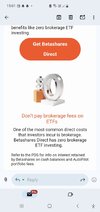- Joined
- 6 September 2016
- Posts
- 1,260
- Reactions
- 1,596
I had ~30% of my total equity position with BetaShares in QUS, which formed the US portion of my equity allocation.
BetaShares has changed their QUS product benchmark from FTSE RAFI US 1000 to Equal Weight S&P 500.
So they went from an extremely well thought out benchmark which is supposed to track the underlying fundamentals of the stocks it holds to one which just buys the losers and sells the winners.
The only benefit to shareholders? 10bps reduction in fees.
Aside from this, how much retail money did they incinerate this year in OOO? And why does their NASDAQ-100 tracker ETF cost 0.48%!!!! p.a in fees when QQQ on NASDAQ has a total expense ratio of 0.2%?
I have sold all my QUS and moved that money to Interactive Brokers where it'll go into a US ETF tracking the same benchmark, PRF.
I am done with BetaShares, their funds will receive no due diligence or investment from me in the future.
BetaShares has changed their QUS product benchmark from FTSE RAFI US 1000 to Equal Weight S&P 500.
So they went from an extremely well thought out benchmark which is supposed to track the underlying fundamentals of the stocks it holds to one which just buys the losers and sells the winners.
The only benefit to shareholders? 10bps reduction in fees.
Aside from this, how much retail money did they incinerate this year in OOO? And why does their NASDAQ-100 tracker ETF cost 0.48%!!!! p.a in fees when QQQ on NASDAQ has a total expense ratio of 0.2%?
I have sold all my QUS and moved that money to Interactive Brokers where it'll go into a US ETF tracking the same benchmark, PRF.
I am done with BetaShares, their funds will receive no due diligence or investment from me in the future.



